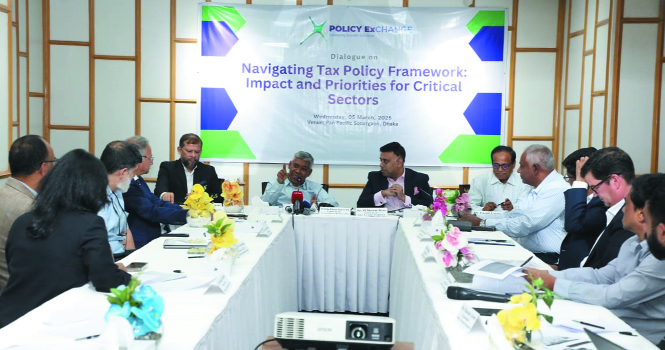

DHAKA : Policymakers and industry leaders gathered on Wednesday at a high-level dialogue to discuss the evolving taxation landscape and its implications for key sectors such as agro-processing, tobacco, energy, and FMCG. The event, titled "Navigating Tax Policy Framework: Impact and Priorities for Critical Sectors," was hosted by Policy Exchange Bangladesh.
The discussion focused on recent tax hikes, particularly in high revenue generating sectors, and broader corporate tax concerns that may impact long-term revenue sustainability, business growth, and foreign investment. Speakers emphasized the importance of predictable and inclusive policymaking to ensure economic stability and sustainable revenue generation, a press release said.
Abdur Rahman Khan FCMA, Chairman of the National Board of Revenue (NBR), attended the event as the Chief Guest. He stated that the government is committed to ensuring a fair and effective tax system that supports economic growth while maintaining fiscal discipline.
"The objective of our tax policy is to create a balance between revenue generation and business growth. We acknowledge the concerns raised by industry leaders and will continue working towards a taxation framework that fosters investment, compliance, and long-term economic sustainability," he said. He further emphasized that tax policies must evolve in response to changing economic realities and that stakeholder engagement remains an important part of the decision-making process.
Kamran T. Rahman, President of MCCI, called for structured dialogue between policymakers and businesses before implementing significant tax policy changes. He stressed that a sustainable taxation framework requires cooperation between the National Board of Revenue (NBR) and industries, as policy shifts without consultation lead to economic disruptions.
Monisha Abraham, Managing Director of British American Tobacco Bangladesh, "The cost of doing business for legitimate manufacturers in the country is increasing. At the same time, the imposition of excessive taxes is having a negative overall impact on business. The total excise burden in the tobacco sector has risen to 83%, which is even higher than World Health Organization (WHO) recommended 75%. As a result, a favorable environment is not being ensured for legal businesses. Therefore, a change in the tobacco tax policy is necessary."
Paul Holloway, Managing Director of JTI stated that excessive taxation could drive the market toward illicit trade and ultimately reduce government revenue. He emphasized that Bangladesh's tobacco industry has historically contributed to steady revenue growth, but the recent tax hikes risk reducing compliance and encouraging unregulated market activities.
Bangladesh's corporate tax rates, standing at 27.5%, remain significantly higher than those of regional competitors such as Vietnam and Thailand, where rates are 20%. Speakers warned that this could discourage both foreign direct investment and local business expansion.
The discussion concluded with key recommendations, including revisiting the January 9, 2025, tax hike on cigarettes, establishing a stakeholder-driven tax reform committee, lowering corporate tax rates to align with regional benchmarks, and ensuring stability in tax policy to avoid abrupt shifts that could disrupt business operations.
